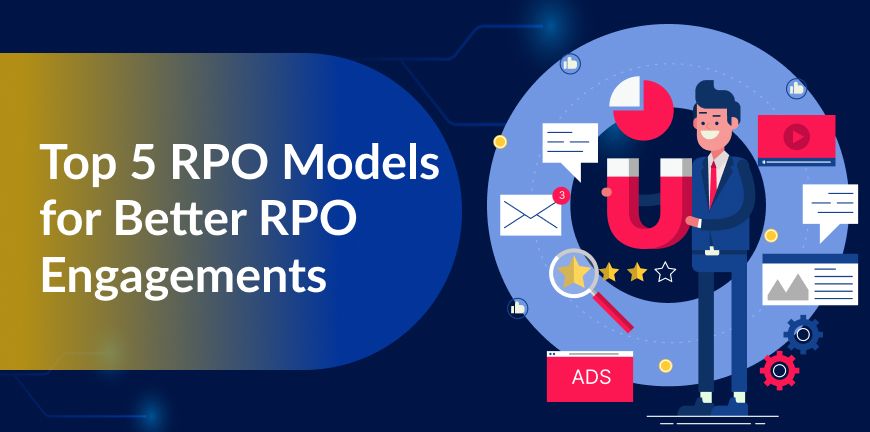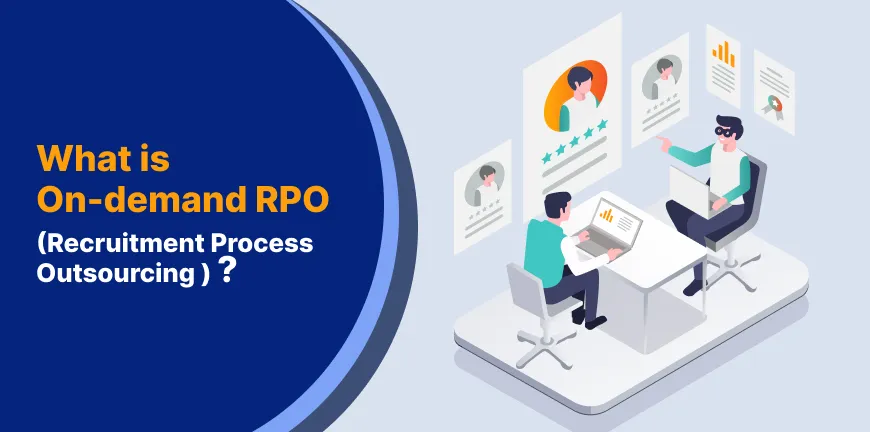
7 Important HR Policies For Startup Company in India
06/07/2022
Payroll Structure in India – Components, Types & Benefits
28/07/2022Introduction
Today RPO model in recruitment has turned into a very effective and flexible solution to meet all your hiring needs. The RPO provider that you go with should have a global talent network and recruitment best practices in place to improve the quality of your hires.
With a recruitment process outsourcing model, you can outsource processes like candidate sourcing, candidate screening, offer execution, interview logistics, compliance, and more.
Customizability is the top benefit of engaging RPO models for hiring needs.
- Choose the right model that aligns with the needs and goals of your company.
- Make sure the services offered by them are human-centered and results-driven.
- Having a custom recruitment RPO model can help you grow your company with the right talent in place.
What are the Top 5 RPO Models in Recruitment?
1. End-to-End RPO
In this RPO model, all recruitment processes and other talent acquisition strategies will be handled by the RPO provider. This is a long-term engagement model that can cover services like candidate attraction, candidate screening, candidate assessment, interview, onboarding, or compliance monitoring. If you have continuous hiring needs then this model is right for your company.
2. Project RPO
This RPO recruitment model will cover all the processes involved in the end-to-end RPO model but on a short-term basis. This model is often used when companies need talent as part of a specific project. The agreement will only be for the tenure of the particular project. You can also make use of this model to test or check out if engaging RPO services are suitable for the long-term goals of your company.
3. Selective RPO
In this model, you can choose to outsource only certain recruitment functions as per your company’s requirements. Specific functions that the internal team may not be adept at like candidate sourcing, applicant screening, candidate management, or recruitment marketing can be taken care of by them. RPO providers can give your employee branding and recruitment marketing strategies a facelift.
4. Recruiter on Demand
This flexible RPO staffing model can be used for projects with short timelines. You can easily tackle hiring spikes or rapid changes within the organization with this model. The RPO provider can customize a flexible hiring strategy that suits your fluctuating recruitment demands. With this model, you can have immediate access to the talent resources of a recruiter who is familiar with your company processes.
5. Contingent Recruiter on Demand
When there is an urgency to fill some positions, you can use this model to supplement the efforts of your in-house team. This is so hiring can happen fast and the RPO provider needs to be paid a fee only if a candidate has been successfully hired. This engagement model is quite fast-paced and hence detailed screening process may not be done like in other RPO models.
What are the Different RPO Pricing Models?
The pricing of the RPO recruitment model can change based on the services provided or on the type of RPO model that you have chosen for your company. Some of the most commonly seen pricing strategies out there are;
1. Cost Per Hire Model
As per this model, a standard amount is fixed and is payable to each candidate hired. This is usually a certain percentage of the annual compensation agreed upon. You need to pay your RPO provider only in the case of a successful hire and this is beneficial for short-term RPO partnerships for a new project requirement or so.
2. Management Fee Model
In this model, the RPO provider will be paid for managing the hiring needs of your company on the whole or partly. This recurring fee will be paid on a monthly basis and the RPO provider will also need to help with employee retention. This model is ideal for a long-term RPO partnership.
3. Hybrid Model
This will be a combination of the management fee and cost-per-hire model. There will be a monthly retainer fee for managing the employees in addition to the percentage of the cost agreed upon per the cost-per-hire model. Suitable for large organizations.
4. Cost Per Transaction Model
This process-based pricing model works on project-specific rates. The overall cost is fixed based on the time incurred towards completing a project or process. This model is ideal only for short-term hiring initiatives.
Finding the Right RPO Model in Recruitment!
You must make an informed decision about choosing the right RPO models.
- A good understanding of your hiring volume is the first step. As you also need to be prepared for the possibility of an increase in the future, the RPO model you decide to go with should be one that best supports your company’s unique needs.
- When demands keep fluctuating it is always wiser to go with external recruitment services. The RPO solution provider needs to act like an extension of your in-house team, keep implementing compliant practices to enhance your hiring function, and offer a solid candidate experience.
- The next thing to consider is the different value-added recruiting functions that your company might require. RPO can offer many services from sourcing and screening, candidate management, employer branding, diversity and inclusion, and technology strategy to talent analytics.
- The other key determining factor is the investment or costing-related details.
At Alp Consulting we can customize the RPO model in recruitment for you, with a specific set of services to directly address your company’s goals, requirements, and recruiting challenges. Our RPO solutions are flexible and designed by our highly experienced HR experts. You can choose to deploy our RPO services in any capacity within a specific department or division.
Frequently Asked Questions
1. What are the different types of RPO?
On-demand model: used to meet the immediate hiring needs of a company. Companies can save a lot of money and time when they entrust this with an RPO provider that is already familiar with the company processes.
Function or project-based model: when the hiring is outsourced for a particular division, or for a new project. This end-to-end approach can be specifically used for a new product launch or the opening of a new branch.
Full RPO model: when the RPO acts like an internal recruiting team and takes care of all the hiring decisions, processes, or strategies.
Selective RPO model: in this model, only specific components of your internal recruitment process will be effectively taken care of by the RPO provider say just sourcing, screening or candidate management.
2. What is an RPO model?
Companies use an RPO model in recruitment when they are met with challenges like a sudden rise in recruitment demand, the technical complexity of roles, lack of geographical coverage, or performance issues within the internal recruitment team. The key thing to understand is that there is not a one-size-fits-all RPO model. There are various RPO models that you can consider. The particular RPO model that you decide to go with should be in line with the needs of your company.
3. How does an RPO model work?
The RPO recruitment model makes use of dedicated recruiters, the latest technology stack, and best-practice hiring processes to enhance your organization’s talent acquisition function. They handle all the major steps of the recruitment process from forecasting to sourcing, assessing, placing, onboarding, and reporting. The clearly defined processes and deep specialization that RPO solutions bring to the table promise you a higher return on investment.
4. How to choose the right RPO Recruitment Model for your company?
The right RPO model for your organization should offer visibility, control, reduced cost, speedy hiring, statutory compliance, best practices in hiring, and the least level of risk. The location of the RPO provider may also need to be taken into consideration and their pricing model as well.
There are different types of RPO pricing models fixed fee, transactional, and performance-based. The RPO model that you choose must align with your company’s long-term goals.
5. What are the costs of RPO?
The costs of RPO are usually determined based on factors like hiring volume, the scope of work, the ancillary services location, position requirements, timing, or resource requirements. The rates of the RPO model in recruitment are usually based on monthly management and placement.
In the case of an end-to-end solution, a baseline cost can be fixed for a minimum volume of hires. For the on-demand RPO model, a set fee will be levied for each candidate who is successfully brought through them and hired.
6. How is RPO different from traditional recruitment?
Though the recruitment process outsourcing model as an industry came from traditional recruiting, there are some key differences between them. Unlike traditional recruitment, RPO assumes complete ownership of the entire recruitment process and is responsible for the results as well.
More than just filling positions RPO transforms the organization’s hiring function on the whole. Their consultation goes beyond people to process and the technology too. While a traditional recruitment partnership with clients is more transactional, the RPO has a more strategic and programmatic partnership.
Contact Us For Business Enquiry

Amit Saproo
Amit Saproo is the Head of Operations at ALP Consulting with nearly 17 years of experience in Executive Search, RPO, Leadership, and IT & Engineering recruitment. He leads nationwide recruitment programs across Technology, BFSI, and R&D domains, driving strategic hiring solutions for diverse client needs. Amit excels in building and managing high-performance teams that deliver scalable, end-to-end recruitment and consulting services.




